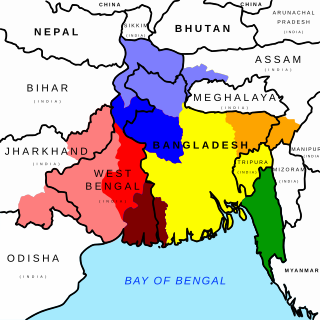
Bengali music comprises a long tradition of religious and secular song-writing over a period of almost a millennium. Composed with lyrics in the Bengali language, Bengali music spans a wide variety of styles.
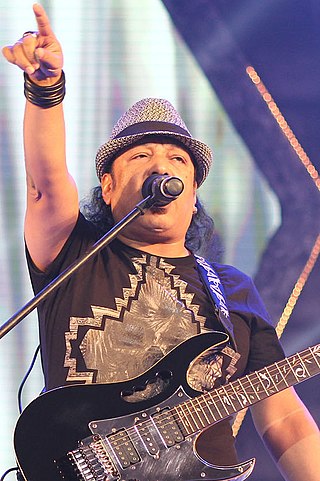
Ayub Bachchu was a Bangladeshi rock guitarist, composer, singer and songwriter, who was the founder of the Bangladeshi rock band Love Runs Blind and earned success as the lead singer and the lead guitarist of the band. He is considered as one of the greatest singers of all time in Bangladesh and a pop culture icon. He was one of the pioneers of Bangladeshi pop music.

Jasimuddin PP IP EP, popularly called Palli Kabi, was a Bangladeshi poet, lyricist, composer and writer widely celebrated for his modern ballad sagas in the pastoral mode. Although his full name is Jasim Uddin Mollah, he is known as Jasim Uddin. His Nakshi Kanthar Math and Sojan Badiar Ghat are considered among the best lyrical poems in the Bengali language. He is the key figure for the revivals of pastoral literature in Bengal during the 20th century. As a versatile writer, Jasimuddin wrote poems, ballads, songs, dramas, novel, stories, memoirs, travelogues, etc.

Love Runs Blind was a Bangladeshi rock band formed in Chittagong City by guitarist, singer and composer Ayub Bachchu. The final members of LRB consisted of vocalist & lead guitarist Ayub Bachchu, bass guitarist Saidul Hasan Swapan, lead guitarist Abdullah Al Masud and drummer Golamur Rahman Romel.
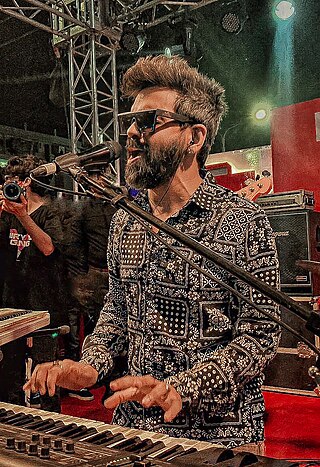
Habib Wahid is a Bangladeshi music composer and singer. He is the son of composer Ferdous Wahid. Habib gained prominence in the early 2000s with his unique fusion of traditional Bangladeshi folk music and contemporary pop elements, earning him widespread acclaim in the country. He is considered as one of the core pioneers of modern pop in Bangladesh.

Faruq Mahfuz Anam James, known mononymously as James, is a Bangladeshi singer-songwriter, guitarist and composer, also known as a playback singer. He is the lead singer, songwriter and guitarist of the rock band Nagar Baul . He is often referred by the name "Guru" which means "Master" or "Teacher".
Bangladeshi rock music, or Bangla rock music, is a style of music in Bangladesh that is derived from British and American rock music, mixed with the Bengali classical and Adhunik musical styles from the 1960s. The genre was introduced in the 1960s by a few bands who began developing a distinctive rock sound. Bangladeshi rock is commonly divided into two categories: East Pakistan rock, and Bangladesh rock. From the 1970s to the 2000s, it was one of the nation's most popular musical genres.
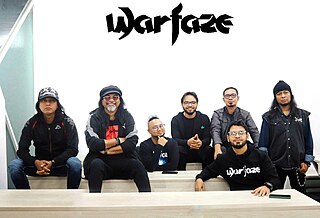
Warfaze is a Bangladeshi heavy metal band formed on 6 June 1984 in Dhaka by Ibrahim Ahmed Kamal, Meer, Helal, Naimul, and Bapi. They are one of the earliest heavy metal bands in Bangladesh. The band had numerous line-up changes since 1984 and since its inception, the band has released seven studio albums, one compilation album, and several singles. They have experimented with numerous sub-genres of rock and heavy metal over the years.

A K M Shafiqur Rahman Tuhin is a Bangladeshi lyricist, music director and singer. As of 2012, he wrote about 1,000 songs. He earned the Bangladesh National Film Award for Best Lyrics for the song Choto Choto Golpo in the film Projapoti (2011) and Citycell-Channel-I Music Award in 2006, 2011 and 2013.

Gazi Mazharul Anwar was a Bangladeshi film director, producer, lyricist, screenwriter and music director. He earned the Bangladesh National Film Award for Best Lyricist a record seven times for the films Tit for Tat (1992), Ajante (1996), Churiwala (2001), Lal Dariya (2002), Kokhono Megh Kokhono Brishti (2003), Meyeti Ekhon Kothay Jabe (2016) and Joiboti Konyar Mon (2021). He worked as a lyricist in the "Swadhin Bangla Betar Kendra". He was awarded Ekushey Padak in 2002 and Independence Day Award in 2021 by the government of Bangladesh. He has penned lyrics for 267 films.

Rashed Uddin Ahmed Topu popularly known as Topu is a Bangladeshi musician, singer-songwriter and composer as well as the lead vocalist of Yaatri. In 2004 Topu formed the band "Yaatri" and began his career with a compilation album Shopnochura released in 2004. He rose to fame with the release of the single "Ek Paye Nupur". and signed with G-Series and released the first band album "Daak" in 2006. He released his first solo studio album Bondhu Bhabo Ki in 2008, followed by the huge popularity, he released four solo studio albums, Shey Ke? (2010) and Aar Tomake (2013), Dekha Hobe Boley (2015)

Satya Saha was a Bangladeshi composer, and musician. His notable composed songs are "Chena Chena Lage" by Shyamal Mitra, "Dukkho Amar Basor Raater Palonko", "Chhiti Dio Protidin" by Sabina Yasmin, "Mon Bole Tumi Asbe", "Rupali Nadire", "Bondho Hote Cheye Tomar" by Subir Nandi, "Akasher Haate Ache" by Shammi Akhter, "Tumi Ki Dekhecho Kobhu" by Abdul Jabbar, "Oi Dur Digonte", "Mago Ma Ogo Ma" etc. He earned three Bangladesh National Film Awards in 1994, 1996, and 2001 in music director and composer categories. In 2013, he was awarded Independence Day Award after his death. He was the father of musician Emon Saha and film director Sumon Saha.
Khalid Hassan Milu was a Bangladeshi singer. He received the Bangladesh National Film Award for Best Male Playback Singer in 1994.

Kamal Ahmed is a Bangladeshi Rabindra Sangeet singer. He is currently serving as the Deputy Director General (Program) at Bangladesh Betar.
Imdadul Haque Khokon is a Bangladeshi dance director and choreographer. In 2010, he won the Bangladesh National Film Award for Best Choreography for the film Mughal-e-Azam.
Lutful Ahmed Labu, better known as Labu Rahman, is a Bangladeshi notable musician, singer, songwriter,composer and Guitar teacher. He is one of the senior guitarists in Bangladesh who played guitar as a session musician with many legendary singers of Bangladesh Like : Sabina Yasmin, Andrew Kishwer, Baby Naznen, Sheik Ishtiak, Kumar Biswajit, Saba Tani and many more artists as live and in their albums. . His current band is 'Feedback' which is also one of the old and famous music bands in Bangladesh. Labu Rahman has also many guitar students who are playing guitar in many famed music bands.
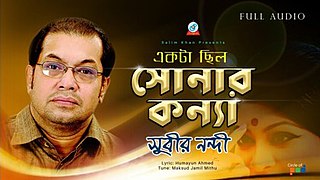
"Ekta Chilo Sonar Konya" is a song from the 1999 Bangladeshi film Srabon Megher Din. The lyricist of this folk music was Humayun Ahmed. Subir Nandi sang this song to the tune with music arrangement of Maksud Jamil Mintu. The song is considered to be the most popular song used in the film. The song was released under label of Sangeeta Music along with other songs from the audio album. Mahfuz Ahmed lip-synced in the scene of this song in the film. Maksud Jamil Mintu and Subir Nandi won the National Film Award for music arrangement and vocals.

Shilaidaha Rabindra Kuthibari, in short Shilaidah Kuthibari, is one of the major tourist places in Bangladesh. It is located seven kilometers north of Kushtia on the banks of Padma in Kumarkhali Upazila of Kushtia District.

Ashiquzzaman Tulu is a Bangladeshi singer, songwriter, musician, composer, lyricist, sound engineer and music director, who was the founder and leader of the popular Bangladeshi rock bands ARK and Chime. He is recognized as a pioneering figure in the music scene of Bangladesh during the 1980s and 1990s.













